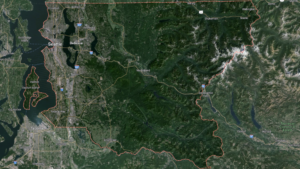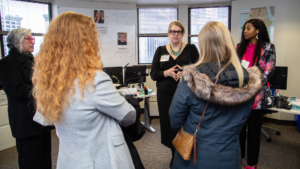It’s been an eventful eight months since Marc came on as CEO at the end of April 2021, and the end of the year offers an opportunity to reflect back and look forward.
First, we want to send a big thank you to our partners, especially the frontline workers—many of whom have their own lived experience with homelessness. Thank you to the outreach specialists, case managers, shelter providers, food banks, churches, administrative staff, nurses, counselors, and every person who works hard every day to care for others. We see you, and we value you.
We also want to say thank you to the business community, to our partners at all 39 cities and King County, and to the community groups, nonprofits and neighbors who are leaning into shared responsibility for solutions.
You are a key partner in ending homelessness—so please forward this email, and read and share this op-ed with your friends and family. Government is what we decide to do together.
What Happened in 2021
Agency Start-Up. The lights are on in the office, we expanded from one employee to 32, and we have a grants and contracts management system ready for the 220+ contracts that transfer to us in January. It is through these contracts that we will unify, redesign, and coordinate the homeless response system.
Funding. We made it through our first budget cycle with the City of Seattle, which will provide 66% of the RHA’s funding in 2022. King County, which will provide about 34% of our funding, will begin its budget process in fall 2022. Our budget also includes $27.9 million in one-time federal relief funds.
Overall, the RHA will manage $162.4 million for homeless service provision in 2022—however, given the updated data on the scale of the need, we will work together with partners to fully resource the work of helping people move from homeless to housed.
Updated Data. The latest integrated data analysis shows at least 40,000 people are experiencing homelessness in King County. That’s over three times what the last Point-in-Time Count showed. This data hits the reset button on our response, and calls for significantly more investment in the tools, services, and workforce required to ensure that every person has access to basic needs.
Sub-Regional Planning. In collaboration with all 39 cities, King County, and nearly 200 organizations, our team is mapping out the services, gaps, and partnership opportunities in our 7 sub-regions so that people experiencing housing instability can find support in the community they call home.
Emergency Housing Vouchers. Under the American Rescue Plan, King County received an unprecedented 1,314 federally-funded vouchers, prioritized for people experiencing homelessness. To date, we have received 1,155 referrals from service providers, the three public housing authorities have issued 851 vouchers, and 44 people have found a home. The bigger challenge is that even with a voucher, it is extremely difficult to find affordable housing here.
What’s Happening in 2022
Even Better Data. With support from the tech community, we are working towards a “By Name List” that will build on cross-systems integrated data and add granular information about who is homeless, where they are, which service providers are involved, and what they need. A By Name List turns numbers back into people, and allows us to manage a system that can help people achieve health, housing, safety, and stability.
System Redesign. Through workgroups and community engagements, together with the people most affected by the homeless response system, we are rethinking how outreach, shelter, support services, crisis response, and paths to housing operate. The redesign work will culminate in a full-system RFP for 2023.
Peer Navigation. Thanks to a $350,000 seed grant from We Are In, the RHA will be designing a peer navigation program to ensure that each customer has an ally who will stick with them from homeless to housed.
High Acuity Customers. In order to address visible homelessness, we must work across sectors to meet the needs of people in acute behavioral health crises, people with co-occurring disorders, and people who are elderly or medically fragile.
Neighborhood Zero. We will execute a place-based strategy of peer navigation, crisis response, a localized By Name List, and service matching across shelter and permanent housing options, to achieve “functional zero” homelessness at the neighborhood level.
What Happens Every Day
Talking to People. Conversation is the work of democracy, and change moves at the speed of trust. By listening, inviting conversation, rejecting “us vs. them” toxicity, and being open and honest, we are establishing a different way of working together.
Centering Racial Equity. Homelessness disproportionately harms people of color, so our work is explicit about advancing racial equity. Learn more about our equity-based decision making framework.
Housing First. Shelter is not a destination, and no one should have to live in emergency shelter long-term. Housing is a basic human need that everyone should have access to. With your help, we can keep the conversation focused on Housing First—a low-barrier, evidence-based path to safety and stability.
Thank you for your partnership, and warm wishes for the holidays.
~ The RHA Team


